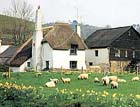Rural housing crisis warning
Waiting lists for affordable housing in rural Britain are getting longer as high prices combined with a lack of supply compounds the problem


Nearly 700,000 people are now stuck on waiting lists for an affordable home in rural England and communities are under threat as a result, the National Housing Federation and the Campaign to Protect Rural England (CPRE) have warned.
Their report says that on average 14,494 people have been added to housing waiting lists in rural areas every month over the past four years, as house prices rose and it became more and more difficult to build affordable housing where residents were against further development. As a result the younger generation have been priced out of where they live and rural communities are under threat, as second home owners come to dominate the market, which puts local shops, schools and churches under threat.
As a result the Federation and the CPRE have launched a charter ‘Save Rural England, Build Affordable Homes’ which has ideas about how to raise the number of affordable homes in rural communities.
The charter is designed to provide ways in which houses can be built for local people in rural communities, and includes
* Ensuring that a fair share of future government spending on social housing is committed to delivering affordable rural homes * Restricting the right to buy in rural areas of acute housing pressure * Ensuring all rural planning authorities set ambitious but achievable affordable housing targets
Federation Chief Executive David Orr said: ‘The rural housing crisis is intensifying rapidly, with more and more people being priced out of the market and having to live in cramped and unsuitable conditions. Ministers need urgently to implement the key recommendations in the [Matthew] Taylor Review and the Federation and CPRE joint action plan if they are to help those in need of an affordable rural home. ‘Without urgent action by ministers many of our villages are in danger of becoming the preserve of the rich and weekend playgrounds for second home owners, with schools, pubs and post offices at risk of closing because of a lack of customers. Others are at risk of becoming very poor – as economic activity and young people of a working age are simply squeezed out.’
Exquisite houses, the beauty of Nature, and how to get the most from your life, straight to your inbox.

